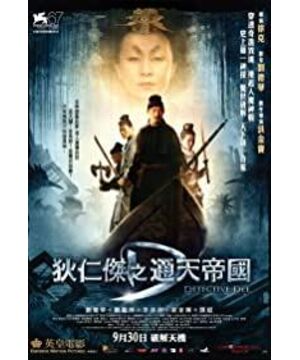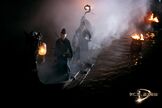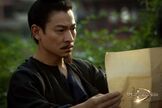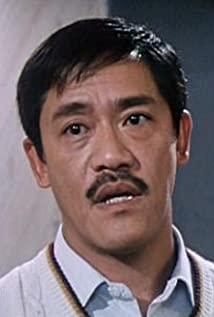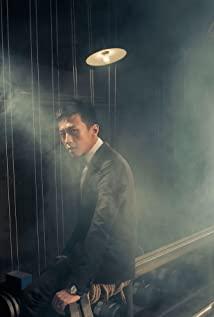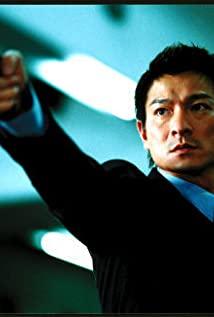"Di Renjie: The Empire of the Heavens" is special not in martial arts, nor in reasoning, but in that it rejuvenates the vitality of the Hong Kong cult. The film is fully equipped with the characteristics of a cult film, combining 2/3 of the "giallo" and 1/3 of the "black detective", but it is wrapped in "wuxia" and "detective". The faceless murderer in the "Lead and Yellow Element", the peculiar modus operandi, the brutal and inhumane method of death, many dual-faced characters who are both righteous and evil, the weird detective who settles the case, the fancy organ... and the "black detective" is good at cynicism. The protagonist and femme fatale are all shown in this film. Although Mr. Xu’s debut novel "Butterfly Bian" is not my favorite, it was novel at the time and has a breakthrough compared with traditional martial arts films, so it is the "new wave" of martial arts films. Thirty years later, are you still using it? Although Old Monster Xu didn’t have too much innovation this time, he could see that he had used his mind and strived to make a breakthrough again-the organ-heavy Tongtian Buddha and the ghostly underground ghost market, for example, the elk controlled by whispers. , A puppet-style killing machine, acupuncture and moxibustion, the gear elevator in the Tongtian Buddha, and the big bug he always loved. The whole world of martial arts is filled with the inevitable yin and yang, which entrenched my heart from the director's delusion like a ghost. Religion (National Teacher) maintains its unique basic functions of stabilizing people's hearts and eliminating dissidents in the film, and is complementary to politics. When the bureaucracy is not satisfied with the function of the regent to deter the monarchs and ministers, the "national teacher" and its witchcraft and deception created by the queen came into being. With their mysterious and grotesque manners, they confuse monarchs and ministers, and become an undercurrent turbulent ruling force. Regarding the relationship between Tian Hou and Jing'er: When Jing'er, who died of love, was dying, Tian Hou leaned over and hugged her. Jing'er asked, "Have the Queen really loved someone?" The Queen replied, "Loved, but it cost a lot." Jinger asked again: "Is it worth it?" The Queen replied, "Worth it." Jing'er stopped her heartbeat, and Tian Hou hugged her tightly, leaving tears. This is the mutual sympathy between women and monarchs and ministers, and it also reflects the ambiguous relationship between them. It is also the same in their political standpoints, the complementary relationship of one dominating internal affairs and one religious rule; especially the Queen of Heaven is repeatedly vigilant. The ambiguity between Jing'er and Di Renjie. All these unspeakable subtle emotions are calmly deduced. Both Li Bingbing and Carina Lau have excellent interpretations of the characters, and both have equal roles. Please pay attention to the opening song – The names of the two are sorted, one left and one right, one up and down, not wanting to be the same. Can not help but remind me of the American film "Skyscrapers on Fire" (1974) in Paul. Newman and Steve. McQueen has the same problem. Regarding the murderer and Di Renjie's thinking change: From the beginning to the middle and later stages of the film, it is difficult to guess the murderer. Originally, the murderer only appeared at the beginning, and most of the time he disappeared without a trace. When the suspects guessed by the audience were almost dead, the director arranged for the real murderer to show up. The audience was surprised and sighed, because there was no reasoning logic at all, and it was entirely in the screenwriter/(Di Renjie)'s arrogance. Guess. But as I said earlier, this is not a detective film, and this arrangement is in line with the conventions of giallo movies, as long as it can follow the plot. The screenwriter adheres to the detective law of "the more impossible the person is, the more the murderer". From the beginning to the end, Sha Tuo (played by Leung Ka Fai), who was a face of injustice and disability, was caught by a white-headed detective with a fierce face from the beginning. Step on your feet. At the beginning of the film, the audience felt sympathy for this role. Even when all the suspicions were dead, if he did not appear, we would not guess that he was the real murderer behind the scenes, but we would wonder why Leung Ka Fai only played such a role. A few minutes of the little person hastily ended. The murderer’s motive was simple, or there was no motive at all. He is just like most men, the empire that has always been the hegemony of men is regarded as a great rebellion by women in power. After all, the situation is reversed, and the patriarchal society for thousands of years will collapse, which will ultimately determine the political consciousness and social attitude of men. The group of "migrant workers" represented by him chose to riot because of repression and distortion. Di Renjie also had this kind of psychology in his early days. Both of them were sent to prison for opposing the Queen’s "listening to politics". But Di Renjie's reading of the manuscript in prison and the facts he learned after his release proved that his previous thoughts were wrong. The Queen's handling of the court rules is clever, and the people live and work in peace. On the contrary, it is a rare phenomenon when the male power is in power. In addition, there are no fewer monarchs murdered by Shatuo than the Queen, so Di Renjie naturally stood on the side of justice. Andy Lau did not die this time: Andy Lau, who had always sacrificed gloriously in the movie, survived this time. In the face of fate, everything bows its head. Although Di Renjie, who is heavy with beetles and poison, saved his old life, he can only linger in the ghost market like a ghost, but this is good, he can avoid intrigue in the court. This also verifies the words of the old inmates, "It's better to go out and be at ease here." Di Renjie’s shaping and verdict are very much like the power of Baskerwell in "The Detective Sherlock Holmes" + "The Name of the Rose" inexpensive. Andy Lau's performance is average. If it were the TV drama version of Liang Guanhua, it would be better. When you think of this big fat man's interpretation, you can think of David. Sumit or Peter. Ustinov's Polo; Li Bingbing is a reversed dress of Brigitte Lin in the ancient costume, handsome on the outside, and magnificent on the inside. Mr. Xu's portrayal of anti-string actresses is always extremely satisfying. Although Old Monster Xu has always been vague about the erotic intentions of the men and women, there is still no lack of humor in the witty words and skin-to-skin contact between the two in the house at the beginning, which reminds me of the two previous paragraphs of the little blade dance music in "A World Without Thieves" . Seeing Wu Yaohan and Teddy Robin's two old dramas, I was very jealous. I can't help but think of the aura of Teddy Robin when he co-starred with Andy Lau in "The Treasure of the Dragons", and now I can only sigh that the years are not forgiving. The biggest weakness of the film is the false air of special effects and scenery, but these are not so important to me who only watch the story.
View more about Detective Dee: The Mystery of the Phantom Flame reviews


